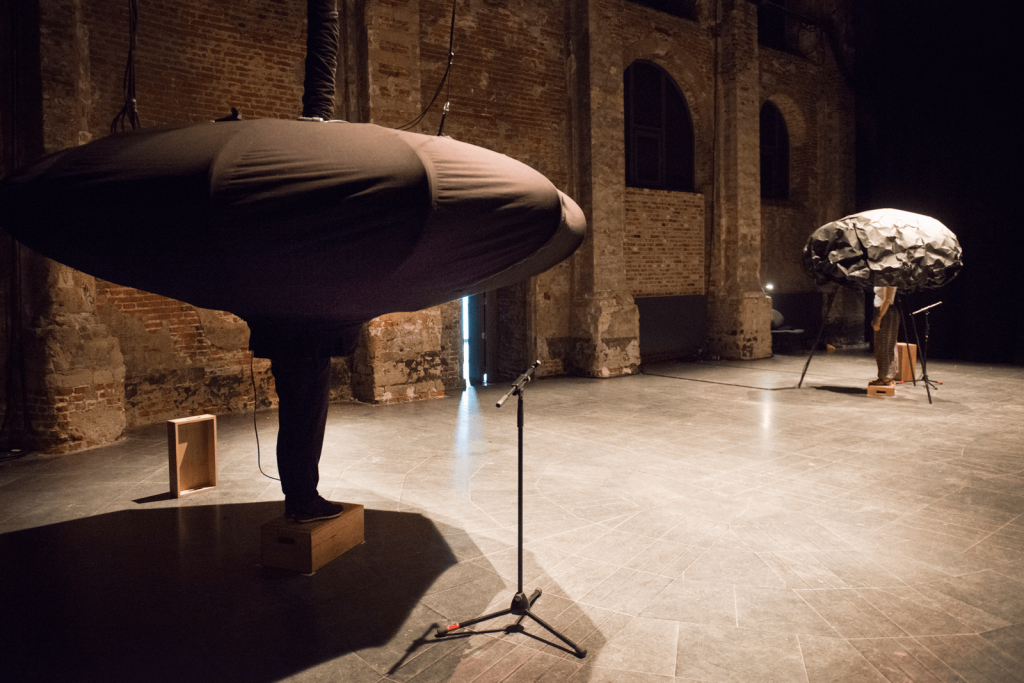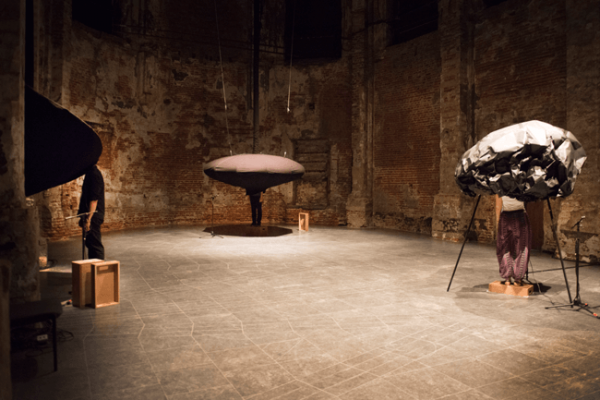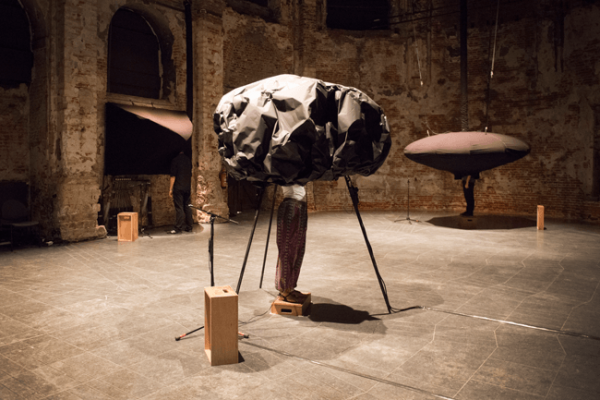Begüm Erciyas
Voicing Pieces, 2016
Installation und Performance
Courtesy the artist
Concept: Begüm Erciyas
Realisation: Begüm Erciyas and Matthias Meppelink
Dramaturgy: Marnix Rummens
Live-operation: Niels Bovri, Eric Desjeux / Lieven Dousselaere, Begüm Erciyas
Text: Matthias Meppelink, Begüm Erciyas, Jacob Wren
Set Realisation: Tim Vanhentenryk, Lena Buchwald, Barbara Greiner
Artistic collaboration: Jean-Baptiste Veyret-Logerias
Project Management / PR: Barbara Greiner
Production: Begüm Erciyas, Platform 0090
Co-production: wpZimmer (Antwerp), STUK (Leuven), Tanzfabrik Berlin/ Tanznacht Berlin
Research support / residency: Kunstencentrum BUDA (Kortrijk), Q-O2 Workspace for experimental music and sound art (Brussels), FrankfurtLAB, Tanzrecherche NRW, Goethe-Institut Villa Kamogawa
Supported by: Hauptstadkulturfonds Berlin
*1982 in Ankara, Turkey
lives in Berlin and Brussels, Belgium
PLEASE NOTE
To our great regret, the work Voicing Pieces cannot take place as planned due to current health requirements.
Even if Begüm Erciyas’ work cannot be experienced in the exhibition, it remains an integral part of the concept and can be seen here on this website.
A delicate conception and an initiation of change, a fragile start, which is also a practice of liberation.
In Voicing Pieces, the visitor’s voice becomes a protagonist in the enactment. In the intimacy of a booth, visitors are led by a simple score. They become the audience of their own voice. The act of speaking while hearing one’s own voice turns into a theatrical and choreographic experience that takes on a new form with every single interpretation of the score. The voice becomes the site of action, a spectacle or a surprise. Aren’t our own voices always strange and uncanny? Who is speaking when you hear your own voice? Instead of recognising ourselves in strangers, Voicing Pieces invites us to perceive the stranger in ourselves.
following text written by Bojana Kunst, 2017
She, the reader, is always a beginner, initiating something. That’s why reading is so seductive: a delicate conception and an initiation of change, a fragile start, which is also a practice of liberation. This quality of reading appeared so clearly the moment I placed the upper part of my body into the mushroom-like structure in the Voicing Pieces performance and opened the first page of the huge book, which was waiting there for me to be read out loud: with the first word the reading opened itself into an unstoppable, overflowing, almost overwhelming sequence of events. My voice tested itself, checked its colour and intensity, adjusting its frequency and the ways it was forming the consonants; but at the same time, it was also given back to me, to the reader. The text started to run through my body with its various shades, repetitions, echoes, coming closer and then receding, until my voice and the text finally uttered the opening of the performance and I read aloud in the isolation of the mushroom: I’m speaking the beginning. I’m starting this sentence without knowing where it is going.

Isn’t this exactly what reading is? We never know when we start reading where we are going, where the voice of the read words (be silent or loud) is taking us. Lisa Robertson, a poet, whose delicate essay on reading echoes strongly with my own viewing of this performance, described that quality of unknown in reading in a wonderful way: “As I read, my self-consciousness is not only suspended, but it is temporarily abolished by the vertigo of another’s language. I’m simply a conduit, its gutter. This is a pleasure.” And pleasure is exactly what is continuously experienced in the Voicing Pieces performance, in our playful reading of the text, waiting for us in the three mushroom-like stations. There is a sheer pleasure in the ways of reading and voicing the words loud into the unknown, towards something, which has yet to come, and our reading is establishing the very event, the very performance we are in. We are playing with words, inclinations, rhythms, repetitions, echoes, sounds, continuously voicing and amplifying these various non-semiotic dimensions of language that give it its affective and emotional qualities; the way in which language touches us, how it is made, how it is coming together, is similar to how poetry affects us. This performance is as much an exploration of the voice as it is an exploration of reading, an exploration of the complex relation between the reading of the written word, its typography, form, position on the page, and dependency from voice; its sensual, vocal and auditory dimension. […] In this performance we trigger the very performance we are in, through the singular and isolated gesture of reading aloud, while at the very moment we actively take over the reading we simultaneously become a vehicle of the events that overflow in their intensity and proximity onto our body and to the text.
Begüm Erciyas was born in Ankara in 1982. While she was still studying molecular biology and genetics, she began to take part in dance projects. This led to her training at the Salzburg Experimental Academy of Dance. Today she lives and works in Berlin and Brussels.


